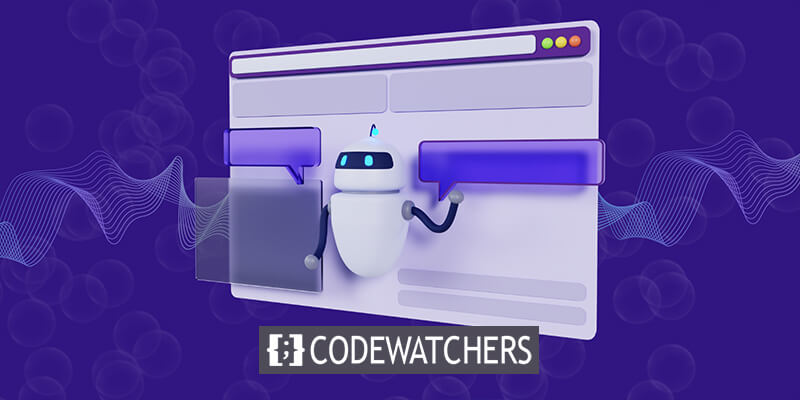Artificial intelligence (AI) is transforming industries worldwide, and WordPress is no exception. AI tools and assistants are emerging that can build websites, generate content, optimize user experience, and more. While current AI lacks human creativity and customization, its capabilities are advancing rapidly.

This article explores how AI is beginning to impact website creation, writing, e-commerce, SEO, and other key areas of WordPress. Though AI brings risks like job disruption, it also presents opportunities to incorporate automation and enhance productivity.
As WordPress enthusiasts, we must adapt by learning these new technologies rather than viewing them as threats. The AI revolution brings changes, but also prospects for expanding skills and business growth if we embrace this transformation. This article outlines the major effects, positive and negative, that AI may have on WordPress in the years ahead.
Impact of AI on Website Building
Artificial intelligence is beginning to enable automated website building through new tools like Wix ADI, Hostinger, and Jimdo.
Create Amazing Websites
With the best free page builder Elementor
Start Now
These platforms use machine learning algorithms to generate complete websites for users based on criteria they input about desired layout, design, branding, images and more.
Additionally we have former website builders like Elementor, Divi that have adopted AI, and incorporated command based automated web development feature in their system.
The AI assistants determine the optimal format and components to build basic sites rapidly without human web developers. Additionally, chatbots like ChatGPT can now produce WordPress code, modify themes, create content and more simply from natural language prompts.
However, AI is still limited in building highly complex, customized sites and cannot match human creativity or strategy. So for now, skilled web developers are still essential for branding, quality assurance, ongoing maintenance and the personalized touch needed for premium websites. But AI will likely handle more basic website building tasks moving forward.
Impact of AI on Content Creation
One major area where AI is making inroads is content creation and writing. Tools like Jasper, Hypertenuse, and Writesonic can now generate entire articles, copy, social media posts, and other written content. These machine-aided writing assistants analyze patterns in existing content and use natural language processing to create original pieces.
While this AI-generated content lacks the creativity and narrative flow of human writing, the technology is advancing rapidly. Already AI can produce reasonably coherent blogs, news reports, product descriptions and more. As algorithms improve, machine-written content will become harder to distinguish from human writing.

For WordPress users, AI writing tools may help generate website copy, blog posts and social media content far faster than writing manually. However, human oversight is still needed to refine, customize and breathe life into AI writing. The personal touch and ability to engage audiences that comes from writers and content marketers remains invaluable. So while AI will disrupt parts of content creation, it cannot fully replace the human element anytime soon.
Impact of AI on User Experience
Artificial intelligence stands to greatly enhance and customize user experience in WordPress through innovations like facial recognition plugins. One example is Real ID, which can identify site visitors and track preferences.

Beyond that, future AI could suggest specific products to each user based on their style, size, color preferences and more - essentially acting as a personalized shopping assistant. This would eliminate browsing and instantly match consumers to items designed for them. Powerful algorithms will get to know customers on an individual level and mimic recommendations from a friend.
These kinds of innovations promise to tailor WordPress e-commerce stores and content management to each visitor, moving beyond simplistic tracking of past purchases.
So while AI currently lacks human-level emotional intelligence, tools like Real ID demonstrate how machine learning will eventually revolutionize and personalize user experience far beyond what developers can code manually.
Impact of AI on Customer Service
Artificial intelligence is driving major changes in how customer service is delivered in WordPress. Chatbots that leverage natural language processing are becoming ubiquitous across websites, mobile apps and social media platforms. These AI assistants field common questions, guide users, and resolve issues automatically without human agents.

Additionally, innovations like voice recognition enable users to get answers audibly through AI assistants modeled after human conversations. Increasingly there may be no discernible difference between chatting with a bot or live agent for simple inquiries. Tools like Hubspot chatbot process users queries and answer accordingly.
Beyond frontline support, AI also shows tremendous potential to enhance sales in WordPress. Machine learning algorithms can identify prospective customers, analyze data to predict leads, and tailor pitches appropriately for closing deals. AI may one day replace entire sales teams.
Lastly, by drawing insights across millions of customer interactions, AI can eliminate the need for lengthy meetings to make product decisions. Algorithms will know exactly what users want before developers do. So AI looks set to revolutionize WordPress customer service, support and business operations.
Impact of AI on SEO
Search engine optimization is another area getting an artificial intelligence boost in WordPress. Tools like SmartCrawl can automatically audit sites for optimal on-page and off-page SEO, then provide recommendations to improve ranking.

This eliminates the need for developers to manually review hundreds of pages to optimize titles, meta descriptions, headings and more.
Additionally, AI plugins can optimize images, fix broken links and leverage social media to extend reach. Instead of relying solely on Google Search Console data, machine learning informs developers about issues in real-time so they can outperform rivals.
As the AI behind these tools grows more advanced, they will essentially handle SEO testing, implementation and reporting autonomously. Developers may one day install a single all-powerful plugin that constantly monitors traffic, surfaces insights, and tweaks sites on the fly to maximize conversions and organic growth. The competitive advantage for WordPress sites leveraging AI for automated SEO will be impossible for manually-optimized sites to match.
Benefits of AI
As illustrated across website building, content creation, UX and more, artificial intelligence brings tremendous potential benefits to WordPress. AI tools like Wix ADI, ChatGPT, Grammarly, Smush and SmartCrawl are just some of the emerging assistants that promise to enhance productivity. Specifically, incorporating AI can:
- Save substantial time by automating tasks like coding, writing and graphic design
- Enable 24/7 operation without human fatigue
- Increase ecommerce sales by customizing recommendations
- Accelerate better decisions using data-driven insights
- Instantly implement SEO best practices at scale
Additionally, AI promises other benefits like:
- Preventing human errors in development
- Making unbiased data-based decisions
- Taking smart risks without consequences to humans
- Generating media like images, audio and video
As the technology matures, WordPress site owners stand to gain huge competitive advantages from AI transformation. The key is for developers to embrace change by incorporating these new tools rather than resisting progress.
Risks of AI
Despite its promise, integrating artificial intelligence into WordPress also poses some real downsides to consider. Relying too heavily on tools like chatbots, copysmiths and website builders could backfire in ways like:
- Permanent job losses for human developers, writers and designers
- propagate misinformation unchecked without human verification
- Lose the personal and creative touch that connects with audiences
Additionally, risks include:
- Soaring costs of AI tools that could outweigh productivity gains
- Violations of ethics and rights through unauthorized content use
- Biased decisions and exclusion if underlying models lack diversity
Some other pitfalls to beware with unchecked adoption of AI:
- Overreliance on black-box algorithms we cannot fully inspect or control
- Data privacy abuses and security vulnerabilities
- Lack of transparency and accountability
While dismissing AI entirely passes up major benefits, embracing it requires carefully assessing dangers. For WordPress to integrate automation while avoiding harm, we must implement governance frameworks addressing transparency, bias checks, and human oversight moving forward. The risks can be managed if we approach AI thoughtfully.
Final Words
The age of artificial intelligence is undoubtedly dawning across countless industries, WordPress included. As highlighted in this article, innovations in website building, content creation, UX personalization and more are rapidly emerging to enhance productivity. Yet despite its promise, AI also poses risks regarding job losses and lack of oversight.
The key realization is that while AI tools are advancing swiftly, full automation that makes human web developers, writers and designers obsolete remains unlikely in the foreseeable future. We still greatly need human creativity, strategy and personalization that algorithms cannot rival just yet. Those who learn to judiciously leverage AI alongside existing skills will thrive.
So rather than worrying about machines taking our jobs, we should focus on incorporating these tools into our workflow. By complementing the strengths of AI automation with uniquely human touches, WordPress practitioners can offer clients the best of both worlds. The AI transformation brings some growing pains but even more opportunities for those who proactively adapt. Our attention is better spent embracing this change rather than resisting the inevitable progress.





